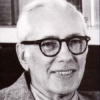Ashley Montagu

Ashley Montagu
Montague Francis Ashley-Montagu, previously known as Israel Ehrenberg, was a British-American anthropologist who popularized the study of topics such as race and gender and their relation to politics and development. He was the rapporteur, in 1950, for the UNESCO statement The Race Question. As a young man he changed his name from Ehrenberg to "Montague Francis Ashley-Montagu". After relocating to the United States he used the name "Ashley Montagu". Montagu, who became a naturalized American citizen in 1940, taught and...
NationalityEnglish
ProfessionScientist
Date of Birth28 June 1905
Children are the most learning-hungry beings in the world.
Because women live creatively, they rarely experience the need to depict or write about that which to them is a primary experience and which men know only at a second remove. Women create naturally, men create artificially.
I want to die young at a ripe old age.
In teaching it is the method and not the content that is the message.
The Good Book - one of the most remarkable euphemisms ever coined.
It is the function of women to teach men how to be human.
Ircumcision, an archaic ritual mutilation that has no justification whatever and no place in a civilized society.
The natural superiority of women is a biological fact, and a socially acknowledged reality.
Intellect without humanity is not good enough...what the world is suffering from at the present time is not so much an overabundance of intellect as an insufficiency of humanity.
Man is the only 150 pound nonlinear servomechanism that can be wholly reproduced by unskilled labor.
One goes through school, college, medical school and one's internship learning little or nothing about goodness but a good deal about success.
Human communication, 'as the saying goes, is a clash of symbols' it covers a multitude of signs. But it is more than media and messages, information and persuasion; it also meets a deeper need and serves a higher purpose. Whether clear or garbled, tumultuous or silent, deliberate or fatally inadvertent, communication is the ground of meeting and the foundation of community. It is, in short, the essential human connection.
There have been some medical schools in which somewhere along the assembly line, a faculty member has informed the students, not so much by what he said but by what he did, that there is an intimate relation between curing and caring.
The doctor has been taught to be interested not in health but in disease. What the public is taught is that health is the cure for disease.